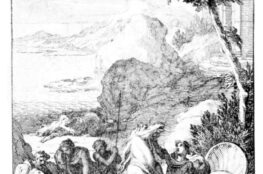Juan Donoso Cortes would likely have been lost to that most obscure sector of intellectual history, the one reserved for prophets of a doom that didn’t quite come to pass, had it not been for the terrorist attacks which transpired on 9/11/01. In the months, then years, after the tragedy, theorists of different stripes began mumbling something about the U.S. — if not the Western world — being in a “state of emergency” or an “exceptional state”; that’s when folks started remember, or discovering, Carl Schmitt. The intellectual banalization of the opening line of Schmitt’s Political Theology — “Sovereign is he who decides on the state of exception” — is worth 10,000 words, but it’s not my concern here. What is of concern is how Schmitt, a theorist of dictatorship and decisionism, reopened interest in Cortes, a man whose writings clearly influenced Schmitt enough to where the latter, in 1950, devoted an entire book to the former. Unlike Schmitt, who received a mixed, but mostly fair, hearing from the professional academic community, Cortes became a subject of pure opprobrium. As a Catholic reactionary who believed that history could only be understood through a theological lens, there wasn’t much room in the theoretician’s toolbags for what the Spanish diplomat had to say. Still, “Schmittians” of various stripes have, from time to time, felt compelled to say a word or two about Cortes. Perhaps it’s time for traditional Catholics to as well.
Doing so is, superficially speaking, easier now than ever before. Preserving Christian Publications, a traditional Catholic publisher and bookseller, has recently reprinted Cortes’s magnum opus, Essay on Catholicism, Liberalism, and Socialism, and Catholic University of America Press still makes available an excellent anthology of his occasional essays, letters, and speeches, Readings in Political Theory. (The title page of my edition refers to the volume as Readings in Political Theology — which is much more apt.) Granted, a number of Cortes’s works remain untranslated, including his posthumously published 1847 work Historical Sketches, but there is certainly enough available to allow us to dig in, right?
Maybe, or maybe not. Cortes is not an easy thinker to follow. First, he is anything but systematic. While there are discernible threads and themes that run throughout his writings, not every point he makes “adds up” to something else; many of his remarks are occasional and only make sense after being placed in their proper context.
Second, as a professional orator with a penchant for over-the-top rhetoric, Cortes routinely fails to exercise due care with his formulations — a flaw which got him into trouble at several points during his lifetime.
Third, Cortes likes to dwell in the theological, but he was no theologian. His use of theological terms and explications sewed more than a bit of confusion back in the day, and some of his declarations are bound to strike contemporary Catholics as disturbing. While it’s unlikely that Cortes actually held any heretical views, it is possible to read him as a fideist who believed in the total depravity of his fellow humans. It takes a lot of patience to dig out the orthodoxy from underneath Cortes hyperbolic declarations.
Last, but not least, Cortes seems, well, outmoded. Can we, good men of the 21st C., speak forthrightly about authority, order, and the exclusive house of truth that is the Catholic Church with neither embarrassment nor apology? Besides, when Cortes declares he would prefer the dictatorship of the sword to the dictatorship of the dagger, is he not lost in his own flourishes while drinking a bit too deeply from the well of proto-fascism? There is some truth to the claim that we cannot quite follow Cortes all the way with regard to his prescriptions. Fearing the onslaught of revolutionary forces in Europe, Cortes rallied to dictatorship not because he desired power for himself, but because he believed it was the only way to preserve the remnants of Western civilization. Cortes was an authoritarian, not a fascist; and unlike his reactionary predecessor Joseph de Maistre, he wasn’t interested in authority for authority’s sake. Under the best of circumstances rulers would be benevolent and just; the Church would supply the conscience of society; and man would watch out for his fellow man. Maistre instinctively distrusted, if not detested, liberty; Cortes wanted it directed toward man’s highest end.
There are still revolutionary forces afoot in the world today, but they are ideological, not political. The rule of law, though twisted, tends to work, and liberalism did not, as Cortes wrongly predicted, give way to rampant socialism. Liberalism, according to Cortes, was dangerous because it was weak; it was bound to let in the revolutionary forces and do nothing except discuss that something must be done. Is it any surprise then that Schmitt, who had front-row seats to the collapse of the Weimar Republic in Germany, could kind a kindred spirit in Donoso? Schmitt, too, had predicted that liberalism was not strong enough to pushback revolutionary tides. In Schmitt’s case, the tide brought in National Socialism; and much to the chagrin of all who continue to adore Schmitt to this day, he opted to give in rather than decry and resist.
Cortes was a man of another era. He neither gave in nor stifled himself in the interest of keeping up appearances. He pointed to the Church as the bulwark of humanity. Unlike us, he didn’t have to deal with the depth of her betrayal from within. That, too, makes Cortes a hard read. Could it have been that the Barque of St. Peter, a ship which today appears to lack a competent crew, remained steadfast for the rights of God and the truth of mankind’s final end? What would Cortes say today about the present state of the Corpus Mysticum and incessant groveling of its prelates before the Zeitgeist? Anything which is not from God is from the devil — or so Cortes would claim. Though no one should feel entirely at home with the Black & White manner in which Cortes almost exclusively viewed the world, his willingness to openly and publicly distinguish between good and evil is distressingly absent within the ranks of Catholicism at the present moment.



